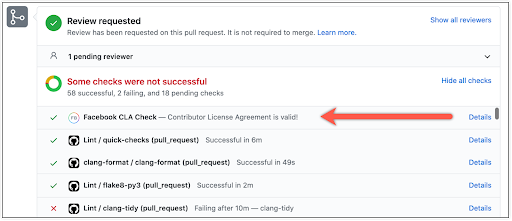To ensure the ongoing growth and success of the framework, we’re introducing the use of the Apache Contributor License Agreement (CLA) for PyTorch. We care deeply about the broad community of contributors who make PyTorch such a great framework, so we want to take a moment to explain why we are adding a CLA.
Why Does PyTorch Need a CLA?
CLAs help clarify that users and maintainers have the relevant rights to use and maintain code contributed to an open source project, while allowing contributors to retain ownership rights to their code.
PyTorch has grown from a small group of enthusiasts to a now global community with over 1,600 contributors from dozens of countries, each bringing their own diverse perspectives, values and approaches to collaboration. Looking forward, clarity about how this collaboration is happening is an important milestone for the framework as we continue to build a stronger, safer and more scalable community around PyTorch.
The text of the Apache CLA can be found here, together with an accompanying FAQ. The language in the PyTorch CLA is identical to the Apache template. Although CLAs have been the subject of significant discussion in the open source community, we are seeing that using a CLA, and particularly the Apache CLA, is now standard practice when projects and communities reach a certain scale. Popular projects that have adopted some type of CLA include: Visual Studio Code, Flutter, TensorFlow, kubernetes, Ubuntu, Django, Python, Go, Android and many others.
What is Not Changing
PyTorch’s BSD license is not changing. There is no impact to PyTorch users. CLAs will only be required for new contributions to the project. For past contributions, no action is necessary. Everything else stays the same, whether it’s IP ownership, workflows, contributor roles or anything else that you’ve come to expect from PyTorch.
How the New CLA will Work
Moving forward, all contributors to projects under the PyTorch GitHub organization will need to sign a CLA to merge their contributions.

If you’ve contributed to other Facebook Open Source projects, you may have already signed the CLA, and no action is required. If you have not signed the CLA, a GitHub check will prompt you to sign it before your pull requests can be merged. You can reach the CLA from this link.

If you’re contributing as an individual, meaning the code is not something you worked on as part of your job, you should sign the individual contributor agreement. This agreement associates your GitHub username with future contributions and only needs to be signed once.
If you’re contributing as part of your employment, you may need to sign the corporate contributor agreement. Check with your legal team on filling this out. Also you will include a list of github ids from your company.
As always, we continue to be humbled and grateful for all your support, and we look forward to scaling PyTorch together to even greater heights in the years to come.
Thank you!
Team PyTorch
